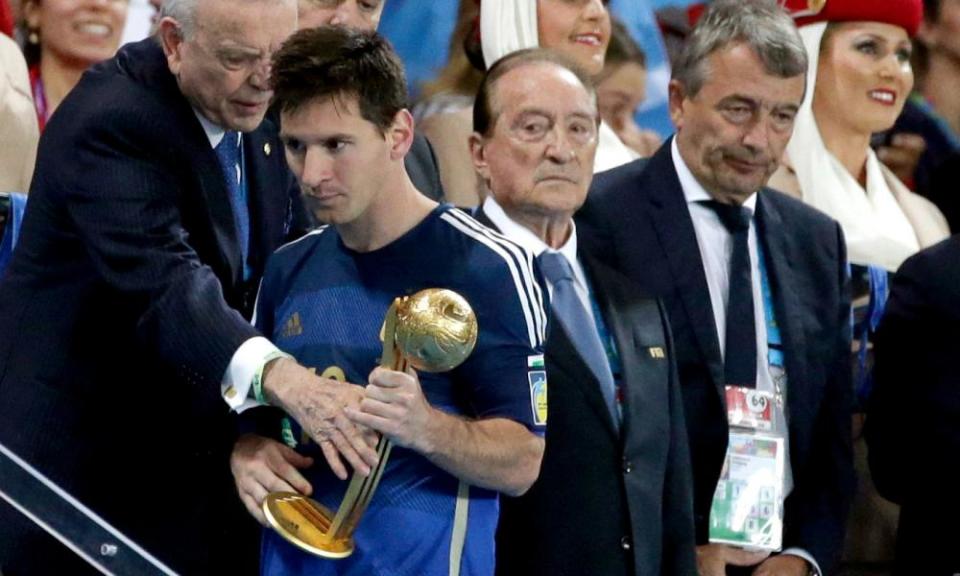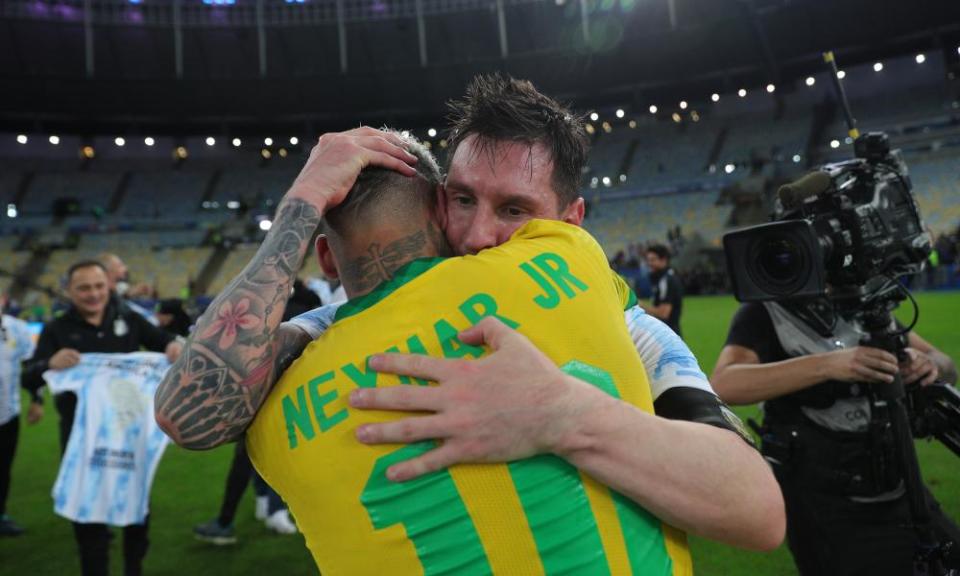Lionel Messi has felt many different emotions in the Maracanã. It was at the iconic Brazilian stadium that he suffered the biggest defeat of his career: the 2014 World Cup final. The loss brought fierce criticism that rocked the Argentine talisman for years. But it was also in Rio that he won the 2021 Copa América, his first title for the national team and which paved the way for the 2022 World Cup in Qatar.
Two years after winning the South American title, Lionel Messi returns to the Maracanã on Tuesday for a World Cup qualifier at the perfect time. Faced with a Brazil in crisis, lost and full of instability since their elimination in Qatar, Messi could receive his final coronation, with the recognition and applause of the rival fans in what is one of the greatest classics in world football.
“It would be an achievement if Messi were cheered in Brazil. It is a match in the Maracanã, a world classic,” said former Brazilian left back Adriano, who played with Messi at Barcelona between 2010 and 2016.
‘I would approve of it if it happened. It would really do his career justice. It would be historic. Even though he is Argentinian, it is a recognition of what he represents in world football.”
Adriano closely followed Messi’s ups and downs over six seasons. There were of course many more positive moments, but the low points always affected the number 10. “I often saw him get angry at the criticism because he had never won the World Cup. There was always a lot of pressure on him to be like Maradona and win the World Cup.”
The most painful defeat was the 1-0 final defeat against Germany in 2014. The failure in Brazil was followed by devastating defeats in two other finals, against Chile during the Copa América in 2015 and 2016. After the second, Messi even retired from the national team team, a decision he reversed two months later.

In one of the rare interviews he gave during that period, he expressed his frustration at being treated as a ‘failure’ by the press, a situation that even his young son Thiago had noticed.
“My six-year-old son asks me why they criticize me so much in Argentina,” he said. ‘I tell him there are only a few, not all. He knows people like me,” Messi said in 2019.
The frustration Messi expressed in that interview haunted him for a long time and was evident to Adriano when his teammate returned to Barcelona after the World Cup five years earlier.
“He came back with that bitter taste. It couldn’t be more different after coming so close to winning something important. There was a lot of pressure on him and people questioned the fact that he was not Argentinian because he went to Spain very young. He was very sad about it because people did not see him as a reference person in the country, that he had no relationship with the country, but it is completely wrong. It’s the opposite. He suffers a lot with the country. He has always had a great feeling for Argentina.”
One of the turning points for Messi was winning the 2021 Copa América, a tournament marked by off-field controversies. After Argentina and Colombia refused to host matches due to the Covid-19 pandemic, Brazil stepped in and was criticized by health experts. Adding to the negative image of holding the tournament in a country with more than 700,000 deaths from Covid-19, Argentina won the title, with Messi ending a 29-year streak of national team trophies in an empty Maracanã .
“The Copa America title made people see Messi differently,” says Adriano. “She [Argentinians] saw the feeling and how he celebrated the title. That really helped him win the World Cup and become one of the greatest figures in Argentina’s history.”
Despite the rivalry with Argentina, Messi is not a hated figure in Brazil. On the contrary, most people have a sense of admiration for one of the greatest players ever. In the 2022 World Cup final and his individual duel with Kylian Mbappé, Messi had the wide support of the Brazilians because Neymar is one of his best friends, and Neymar’s relationship with the French forward has never been friendly.
“Everyone wanted him to win so he could write football history,” says Adriano. “He turned things around not only because of his quality, but also because of his intelligence and his teamwork. He always fights. There’s no way not to run from him. It was a privilege to have learned and lived with him for six years.”
But while Messi is enjoying a World Cup honeymoon with the Argentine fans, Brazil is going through one of the biggest crises in its history. Besides not having won a World Cup since 2002, matching their longest streak from 1970 to 1994, the Seleção are in chaos.
Since Tite’s departure after Qatar 2022, Brazil no longer has an official coach. Brazilian Football Federation president Ednaldo Rodrigues says he has an agreement with Real Madrid’s Carlo Ancelotti to take over in May next year, but the Italian has never confirmed the deal nor given any sign that there will be any is a possibility. of taking over the team for the 2024 Copa América.


Until the new coach arrives, caretaker Fernando Diniz finds himself in a strange situation, working double duty. In addition to coaching the Seleção, he also manages Fluminense. His club will play São Paulo on Wednesday, with the coach back at the Maracanã, less than 24 hours after Brazil face Argentina.
Brazil not only does not have a definitive coach, but also lacks great idols. Neymar is 31, injured again and will be out of action for the coming months. The same goes for Vinícius Júnior, who should be the Al-Hilal player’s successor as team leader. Without idols, the country tries to hold on to the past. Jorginho, the former right back who won the 1994 World Cup and is now a coach, sees the moment as similar to the one he experienced almost two decades ago.
“In 1994 we were under a lot of pressure, but at the same time we realized that this was our great opportunity to put our name in the history of Brazilian football and world football. In difficult times you have the opportunity to change your story,” he says.
Another 1994 winner, Branco, the former left back who is now coordinator of Brazil’s youth teams, agrees and demands more from experienced players in the squad.
“Every cycle you don’t win, your work is called into question,” he says. “In 1994 I took part in my third World Cup. The pressure is there, but over time you learn to handle every situation better. I knew what needed to be done and used that experience to my advantage. Me and the ‘dinosaurs’, the group of older players, had the job of looking after the younger players. That turned out very well.”